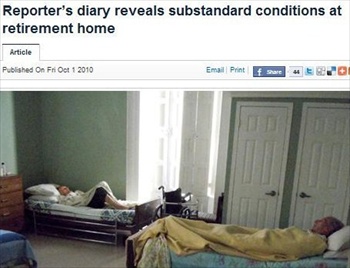
See above a detail of a screenshot from the Toronto Star's Dale Brazao's report on a nursing home. Brazao, who took the photo in the above image, went undercover for a week. (Credit: Dale Brazao, Toronto Star)
The Toronto Star’s public editor Kathy English used her Oct. 9 public editor column to explain why one of the newspaper’s reporters recently went undercover.
The reporter, Dale Brazao, posed as a resident of In Touch retirement home for a week. The investigation into the home came after the newspaper “had received complaints from credible sources outlining potentially serious problems.”
English defended the use of undercover reporting because Brazao’s investigation produced information “vital to the public interest.” Further, “there was no other way to get this story and know the conditions inside the home, and the nature of the deception was fully disclosed to readers.”
The Star’s story also didn’t rely only on Brazao’s research, either. Investigative reporter Moira Welsh also conducted research for the story in a “more classic” way – through public record searches and interviews.
English reported that the Star’s investigations editor, Kevin Donovan, “decided it was necessary” to have an undercover reporter investigating the retirement home with an insider’s perspective. “It became clear to me that this was a rare case where we could not properly tell the story without seeing what was going on inside,” Donovan is quoted as telling English.
Further, English noted that “retirement homes in Ontario are unregulated, and vulnerable elderly residents are at risk.”
English, who disclosed that she worked as an undercover reporter in an old age home for a month in 1982, noted that recently the ethics of undercover reporting have come into question.
“The notion that investigative reporting is all about going undercover to expose wrongdoing is somewhat outdated, harking back to the 1970s when numerous high-profile undercover exposés, particularly in tabloid TV, were widely undertaken,” English explained.
Because undercover reporting puts journalism ethics at odds — journalists are supposed to find the truth, not lie to get to the truth — English opined that undercover journalism hasn’t been as popular in recent years.
Brazao has gone undercover a total of three times now, English reported. She added that “senior editors must approve” any undercover reporting and that the newsroom’s ethics manual only permits the practice “as a ‘last resort’ to get a story where the public interest justifies it.”
English reported that The Star’s managing editor Joe Hall approved the undercover retirement story but that privacy was one of the concerns in the story. Looking at Brazao’s story online, one can see that the lead photograph, for example, doesn’t show the resident’s face and only names him by his first name. Also, Brazao’s reporter’s diary explains that names of residents were changed.
The initial Oct. 1 investigative report can be read here. It is co-bylined by Brazao and Moira Welsh, and details neglect, unsanitary conditions, and questionable financial standards. The report includes both Brazao’s experiences in the home and formal police complaints against the home and its owner, Elaine Lindo.
In addition, the Star published an Oct. 3 editorial calling for protection of seniors in retirement homes, Brazao also published a “diary” detailing his week inside, and the Star posted a photo gallery accompanying the newspaper’s numerous reports here.
In another Oct. 1 article, Moira Welsh reported that Lindo claims that Brazao “faked the problems” and “Fabricated the photographs.” Lindo also reportedly “Gave tours of her home to the media — not the Star — and reporters said they saw a clean home and residents eating good food.” Walsh also detailed the political reaction to the Star’s report, noting that “The Ontario progressive conservative caucus immediately sent a letter to the government Friday calling for a sweeping investigation.”
See other investigations by the Star here and other StinkyJournalism reports on undercover reporting here.
The Society of Professional Journalists’ advises journalists “avoid undercover or other surreptitious methods of gathering information except when traditional open methods will not yield information vital to the public. Use of such methods should be explained as part of the story.”
iMediaEthics has written to Brazao and will update with any response.





Comments Terms and Conditions